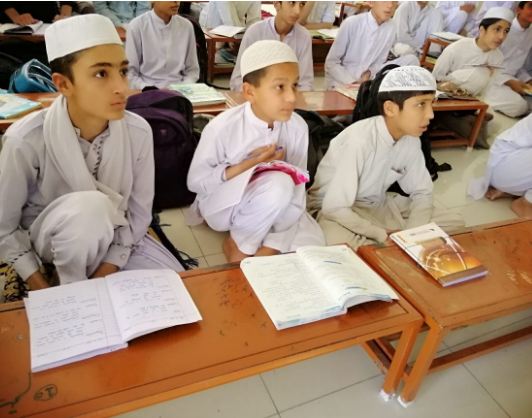Mohammad Allawal Jamal
Madrassas, traditional Islamic educational institutions, hold a significant place in Pakistan’s cultural and social fabric. These institutions have historically played a crucial role in providing religious education and guidance to countless students, contributing to the moral and spiritual development of society. However, it is now evident that reforms in the madrassa education system are imperative to address various shortcomings and align with the demands of the contemporary world.
Students in madrassas face a multitude of challenges, ranging from inadequate teaching standards to limited resources and a curriculum that is often outdated and disconnected from the broader academic syllabus. The lack of a comprehensive and standardized curriculum means that students are deprived of a well-rounded education, inhibiting their ability to integrate into modern society and pursue diverse career paths.
Moreover, the issue of security within these institutions remains a pressing concern. The safety and well-being of students should be a top priority, and stringent measures need to be in place to ensure a secure learning environment. Proper regulation and oversight are essential to guarantee the protection of students within the madrassa system.
In light of these issues, it is vital to advocate for regulatory reforms that ensure the quality of education within madrassas. Introducing a single national curriculum, in line with Pakistan’s overall educational framework, would help standardize the educational content, ensuring that students receive a more comprehensive and contemporary education. This should be supplemented by rigorous teacher training programs to enhance teaching standards and methodology.
Furthermore, regulating the appointment of teachers and directing funding and donations through government oversight are essential steps to maintain transparency and accountability within the madrassa network. This would not only improve the quality of education but also help curb any potential extremist ideologies that may infiltrate these institutions.
Preserving the religious significance of madrassas while incorporating modern reforms is crucial. Reforms should be implemented in a manner that respects the Islamic heritage and values that these institutions embody. The essence of religious teachings should be retained, fostering an environment where students can not only deepen their religious understanding but also acquire the skills and knowledge necessary to thrive in a contemporary society.
To truly reform the madrassa education system, it is crucial to engage with stakeholders, including religious scholars, educators, policymakers, and the community at large. A collaborative approach that incorporates diverse perspectives will ensure that the reforms are effective, sustainable, and respectful of the cultural and religious context in which madrassas operate.
In conclusion, while madrassas have long been an integral part of Pakistan’s educational landscape, adapting them to meet the demands of the modern world is a necessity. Balancing tradition with progress is key, and reforming the madrassa education system through regulation, standardization, and modernization will not only enhance the quality of education but also contribute to a more prosperous and harmonious society. It is time to embrace change and empower the youth within the madrassa system for a brighter and more inclusive future.

















